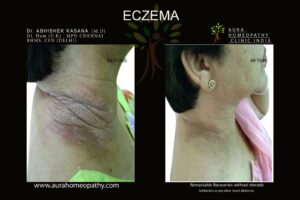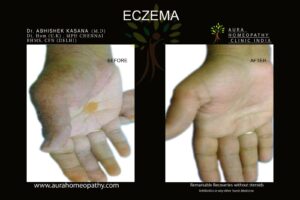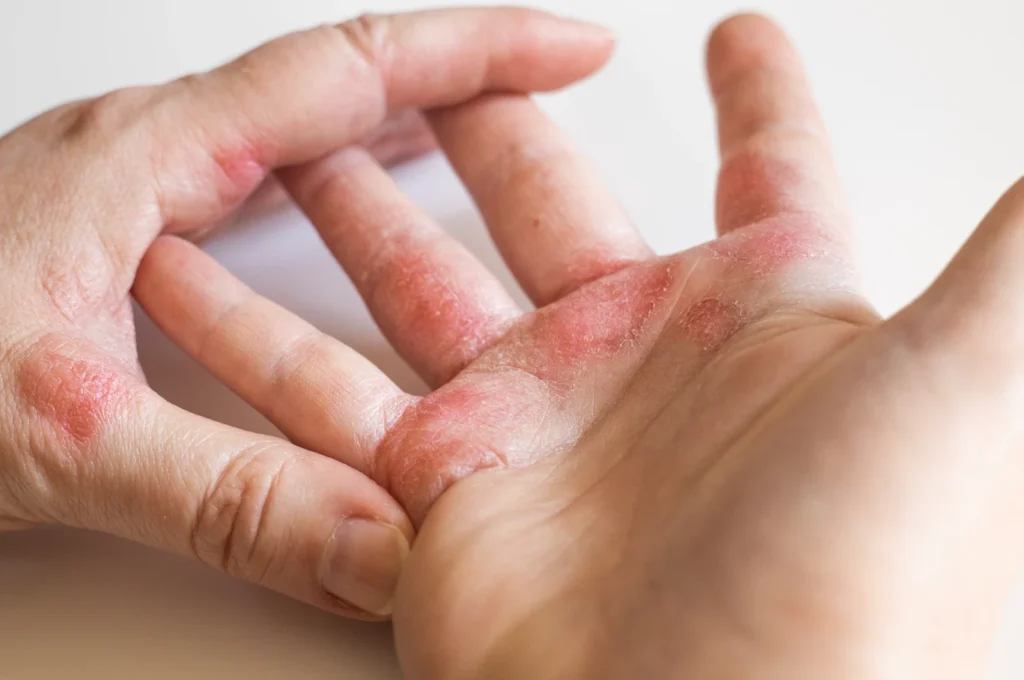In this article, we will emphasize Homeopathy Treatment For Atopic Dermatitis Or Eczema.
Atopic Dermatitis, a chronic skin condition known for causing dry, itchy skin alongside inflammation, is a struggle for many. Often referred to as Atopic Eczema or Endogenous Eczema, this non-contagious ailment cannot be passed through direct contact. A variant of this condition seen in infants is called Infantile Eczema. Typically manifesting in early childhood (usually before the age of 5 years, with many cases appearing between 3 to 6 months of age), Atopic Dermatitis may resolve during childhood for some, while for others, it persists into adulthood. The condition is characterized by cycles of remission, where skin inflammation subsides, and relapse, where flare-ups of the condition occur.
Homeopathy presents an effective approach to treating Atopic Dermatitis, leveraging natural substances to mitigate the severity of symptoms, reduce itching, and promote the healing of rashes and skin eruptions. Homeopathic remedies for Atopic Dermatitis focus on the holistic well-being of the patient, aiming to address the root causes of the condition and support the body’s natural healing processes. These treatments, derived from natural ingredients, offer a gentle yet potent solution for those dealing with the challenges of Atopic Dermatitis, providing relief and improving the quality of skin health.

Homeopathy Treatment For Atopic Dermatitis Or Eczema
Atopic dermatitis (AD), also called atopic eczema, is a chronic, inflammatory disease that primarily affects the skin. 60% of cases begin in the first year of life and another 30% do so between the second and fifth. And few cases start in adult life. It is characterized by the appearance of pruritic (itchy) reddish-colored lesions. These lesions, although they can affect any sector of the skin, have a very characteristic distribution: they tend to affect the large joint folds such as the hollows of the knees and elbows, the neck, and behind the ears. In infants, involvement of the cheeks and the region around the eyes is common. In adults, it is often limited to the hands and feet, in a form of allergy called dyshidrosis. Although the lesions are generally dry, Due to the intensity of the scratching, excoriations are produced, sometimes bleeding, and they can become infected and become moist and secreting.
Despite their name, which suggests an exogenous origin, most atopic do not trigger their manifestations due to an allergic reaction to external elements such as food. On the contrary, this disease has a very important hereditary component. Although various external factors can aggravate the problem: heat or cold, dust, perspiration, wool clothing, stress, some foods and infections, depending on the particular sensitivity of the patient. most atopics do not trigger their manifestations by allergic reaction to external elements such as food.
Atopic dermatitis is often associated with other forms of allergy. 30% of children with Atopic dermatitis also develop bronchial asthma and 35% suffer from allergic rhinitis. Other related conditions are allergic conjunctivitis and secretory ear disease. Traditionally homeopathic physicians believe that this shift of disease from the skin to the respiratory tract could be due at least in part to the “suppression” of skin manifestations with local treatments.
The quality of life of patients suffering from Atopic dermatitis is affected in several ways: sleep disturbances due to itching, the need for special clothes and soaps, marginalization by their peers, the associated dry skin, inability to carry out some activities such as swimming, discomfort and costs of using creams and frequent visits to the doctor. The prevalence of Atopic dermatitis has increased steadily in recent decades in industrialized countries. It currently affects 10-30% of children and 1-3% of adults.
Conventional treatment is based on the use of moisturizing creams, topical or oral corticosteroids, antihistamines, the so-called calcineurin inhibitors and immunosuppressive drugs. All these forms of treatment have their potential adverse effects. According to research done in India, half of patients turn to alternative treatments, mainly homeopathy, due in part to dissatisfaction with conventional treatment. Aura Homeopathy Treatment For Atopic Dermatitis Or Eczema provide promising results. At Aura Homeopathy Clinic India, our team of best homeopathy doctors in India have traditionally treated Atopic dermatitis.
Already in 1991 Spence in Great Britain published a retrospective investigation with the follow-up of 130 patients with eczema, atopic or not, 86% of whom showed significant improvement with homeopathic treatment. 1 .
Get your self treated by team of Best Homeopathic Doctor in India for Atopic Dermatitis @ Aura Homeopathy India
In 2003, R. Itamura, from the Dermatology Department of the Obitsu Sankei Hospital in Japan, reported in a publication the good response to homeopathic treatment of 17 patients with severe and untreatable Atopic Dermatitis of 3 to 41 years of evolution, with poor response to conventional treatments. , of which 6 had 80% improvement or cure and 11 manifested improvement of more than 50%. 2
More recently, in a comparative study of 118 German children with Atopic Dermatitis treated either conventionally or with homeopathy, after one year the perception of improvement in the disease and quality of life improved similarly in both groups. 3
Also Adler, from the Clinic of Homeopathy and Dermatology of the Jundiaí School of Medicine, Brazil, describes an improvement of more than 50% in 17 of 19 patients with Atopic Dermatitis after an average of 9 months of treatment. 4
Claudia Witt, from the Charité University Medical Center in Berlin, describes the follow-up of 225 children with AD treated for 2 years with homeopathy and reports a very significant improvement not only in eczema but also in associated diseases, mainly asthma and other forms of allergy , in addition to a very marked reduction in the use of conventional medication. 5
Two papers were published in January 2012. Elio Rossi of the Regional Homeopathic Reference Center of Tuscany describes improvement or cure in 62.5% of 213 children with AD and associated atopic diseases, improvement that is maintained 8 years after having done the treatment. 6
José Eizayaga of the Maimónides University of Buenos Aires (author of this note) describes significant improvement or cure in 82.4% of 42 patients, children and adults, who underwent homeopathic treatment. 7
The only attempt at a randomized, placebo-controlled clinical trial that was carried out could not reach any conclusion due to the significant number of patients who dropped out of the study. 8
In this type of study, patients are randomly divided into two groups. One receives the treatment being tested and the other a placebo indistinguishable from the true treatment. Although it is the most accurate way to assess whether the treatment produces an evolution different from the simple passage of time, its results are not always extrapolated to the real world. The problem of abandonment of homeopathic treatment is a frequent obstacle when evaluating the results. The reasons are several, but curiously one of the main ones and the cause of half of the dropouts is the improvement that the treatment produces. 7.9. Homeopathy Treatment For Atopic Dermatitis Or Eczema is highly recommended.
Homeopathy Treatment For Atopic Dermatitis Or Eczema
The treatment of Atopic Dermatitis through homeopathy is marked by a highly efficient, natural approach. Initially focusing on managing the acute symptoms, homeopathic treatment progresses to using constitutional remedies tailored to the individual’s unique symptomatology, aiming for a root-level resolution of the condition. The selection of homeopathic medicine is a precise process, reliant on a comprehensive understanding of the individual’s symptoms. This includes the location and nature of the skin eruption, factors that exacerbate or alleviate symptoms, the timing of itching episodes, the individual’s response to variations in temperature, and any distinctive mental or emotional symptoms that may be prominently exhibited.
By addressing these specificities, homeopathic remedies endeavor to fundamentally eliminate Dermatitis by bolstering the patient’s immune system. This enhanced immunity aims to prevent recurrent flare-ups, promoting long-term relief and skin health. It’s important to acknowledge that the homeopathic route to managing Atopic Dermatitis requires patience, as treatment durations can vary widely—from several months to over a year—based on the condition’s severity, the duration of Dermatitis prior to treatment, and the patient’s responsiveness to the selected homeopathic remedy. This patient-centered, holistic approach underscores homeopathy’s commitment to treating not just the symptoms but the individual as a whole, fostering an optimal environment for healing and well-being.
References
- Spence DS. Homœopathic treatment of eczema: a retrospective survey of 130 cases. British Homoeopathic journal. 1991;80(2):74–81. http://www.sciencedirect.com/science/article/pii/S0007078505803916
- Itamura R, Hosoya R. Homeopathic treatment of Japanese patients with intractable atopic dermatitis. Homeopathy. 2003;92(2):108–14. http://www.ncbi.nlm.nih.gov/pubmed/12725253
- Keil T, Witt CM, Roll S, Vance W, Weber K, Wegscheider K, et al. Homoeopathic versus conventional treatment of children with eczema: a comparative cohort study. Complement Ther Med. 2008;16(1):15–21. http://www.ncbi.nlm.nih.gov/pubmed/18346624
- Adler M, Adler U. Der Einsatz von Q-Potenzen bei atopischem Ekzem: Bericht über eine Fallserie. Zeitschrift für Klassische Homöopathie. 2010;54(02):86–92. http://www.thieme-connect.de/DOI/DOI?10.1055/s-0029-1242609
- Witt CM, Lüdtke R, Willich SN. Homeopathic treatment of children with atopic eczema: a prospective observational study with two years follow-up. Acta Derm. Venereol. 2009;89(2):182–3. http://www.medicaljournals.se/acta/content/?doi=10.2340/00015555-0580&html=1
- Rossi E, Bartoli P, Bianchi A, Da Frè M. Homeopathy in paediatric atopic diseases: long-term results in children with atopic dermatitis. Homeopathy. 2012;101(1):13–20. http://www.sciencedirect.com/science/article/pii/S1475491611001159
- Eizayaga JE, Eizayaga JI. Prospective observational study of 42 patients with atopic dermatitis treated with homeopathic medicines. Homeopathy. 2012;101(1):21–7. http://download.journals.elsevierhealth.com/pdfs/journals/1475-4916/PIIS1475491611001123.pdf
- Siebenwirth J, Lüdtke R, Remy W, Rakoski J, Borelli S, Ring J. Effectiveness of a classical homeopathic treatment in atopic eczema. A randomised placebo-controlled double-blind clinical trial. Forsch Komplementmed. 2009;16(5):315–23. http://www.ncbi.nlm.nih.gov/pubmed/19887810
- Endrizzi C, Rossi E. Patient compliance with homeopathic therapy. Homeopathy. 2006;95(4):206–14. http://www.ncbi.nlm.nih.gov/pubmed/17015191

